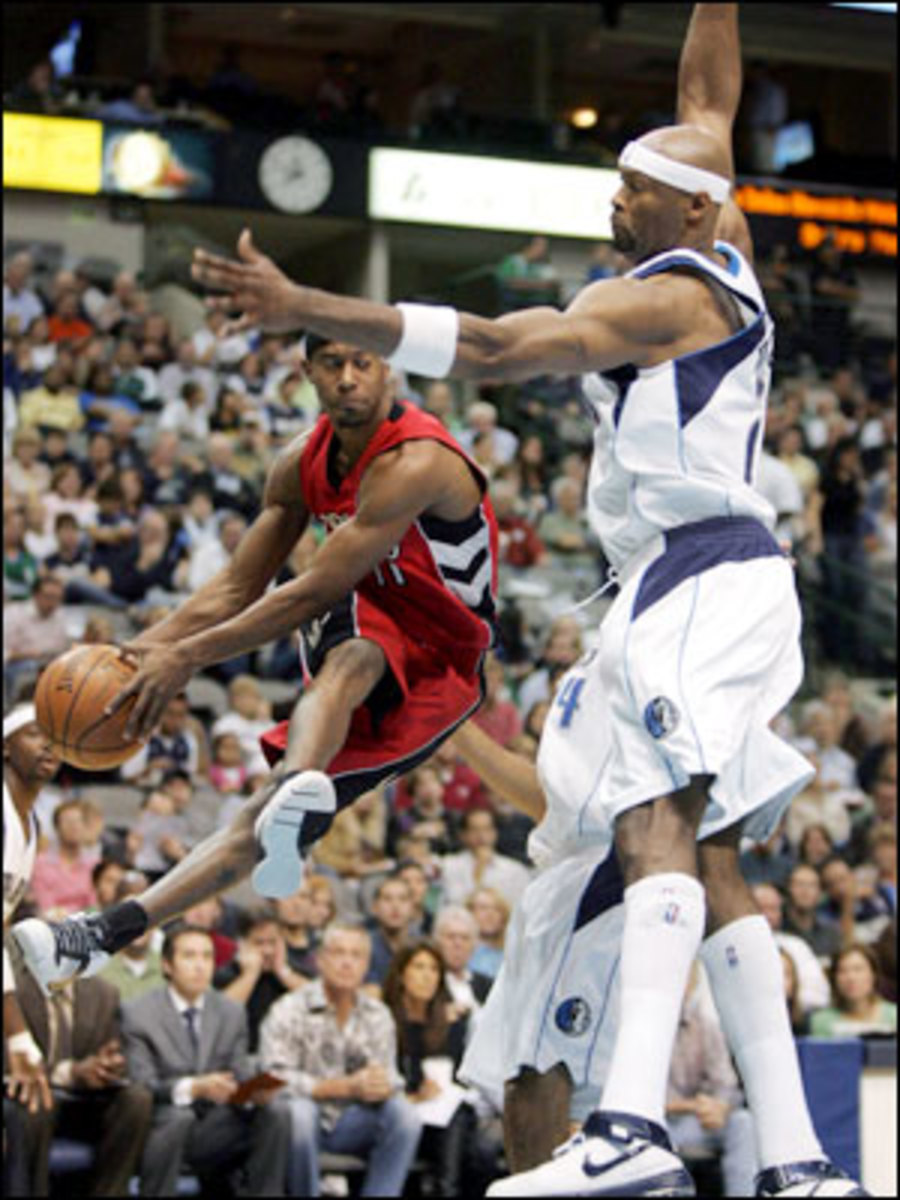Ford tough
The haunting pictures of T.J. Ford's neck snapping back as Al Horford swiped at his head, of Ford on his back in tears as his Toronto Raptors teammates prayed and of the immobilizing stretcher rolling him off the court yet again -- these frames hint at his worst fears come true.
This is why Ford, at 5-foot-10 and 165 pounds, is one of the NBA's most courageous players. He was born with spinal stenosis, a narrowing of the spinal canal that can put pressure on the nerve and spinal cord, and cause tingling and numbness in the arms and legs.
Earlier in his career, he had lost feeling in his extremities after four different collisions on the basketball court dating back to Willowridge High School in Sugar Land, Texas. In May 2004, he underwent surgery to fuse two vertebrae in his neck where the narrowing of his spinal column was the most severe. Ford was told after the surgery that he was no longer at greater risk of paralysis than any other player. That confidence vanishes during an incident like the one Tuesday in Atlanta, which was preceded by stingers -- aggravations of the nerves in his arms -- that sidelined Ford at the end of last season as well as earlier this month.
Yet he insisted during a visit to the Raptors' locker room Wednesday, shortly after his release from the hospital in Atlanta, that he considers himself neither reckless nor brave for continuing to play. This is consistent with his statements two years ago, when he said he would retire from basketball if he thought he was risking severe injury.
"I wouldn't want to walk away -- but I could,'' Ford told me during an interview for a Sports Illustrated feature after his return from neck surgery in 2005-06 to play for Milwaukee. "Because I felt like I experienced my dream [of playing in the NBA]. I experienced it for half a season, and I knew in my mind that I played against these guys and I could compete, and I feel that I'm better than some of these guys. So with that I feel like I could live just because I experienced it, compared to if I had never even played in the NBA. But knowing what I'm capable of doing, I would be able to back away from it.''
A three-inch scar runs along the back of Ford's neck. "I know what it feels like to almost play my last game,'' he said two years ago. "No one knows how long we're going to live. You live every day to the best of your ability and enjoy your life because once it's over, it's over.''
Though Ford won the Naismith and Wooden player of the year awards as a sophomore at Texas, some teams refused to draft him because of his spinal condition. But other teams cleared him to play. Before the Bucks took Ford with the No. 8 pick in 2003, according to general manager Larry Harris, the team was aware of three episodes in which Ford had suffered a loss of feeling in his extremities. The third of these incidents took place in April 2003, after Ford had led Texas to the Final Four. He was driving to the basket during a pickup game at the campus rec center when he tripped headfirst into the thigh of teammate Royal Ivey and fell to the ground. "I can't move!" Ford cried, lying flat on his back.
"He kept saying he couldn't feel his legs, his fingers, anything,'' said Ivey, now a backup guard with the Bucks. "He was paranoid and scared, and I was telling him to calm down, it was going to be all right.''
At that time, Ford was more worried about his career than his health. "I had just signed with my agent, so no way I can go back to school,'' Ford said. "I thought, 'Now my dream is over. No one is going to draft me.' ''
Ford regained feeling within 20 minutes and made a complete recovery within a month.
I recall these memories to emphasize Ford's bravery each time he vaults himself into the paint, juking the ball away from giants who often clobber him instead. Raptors president Bryan Colangelo has asked Ford to consider a safer way of playing in hope of avoiding more trauma. But Ford has already toned down his game: During his rehab from neck surgery, former NBA coach John Lucas helped him improve his jump shot (to reduce his visits into the paint), run in a more upright gait and protect himself by maintaining his balance as he leaps into contact.
Yet the move during his rookie year that sidelined him for the ensuing 2004-05 season seemed harmless: a mid-air collision with 6-9, 236-pound Mark Madsen that landed Ford on his rear end.
"I remember going to the hospital that night and thinking it was unbelievable that two hours ago he's running up and down the floor,'' Harris said. "Now here he is in an MRI machine, and I'm thinking that he may never play again.''
Ford plans to wait at least a week before he resumes practicing with the Raptors, who acquired him from Milwaukee for Charlie Villanueva in June 2006. He has been playing for a decade now despite these kinds of injuries, and he intends to continue so long as doctors insist that he is not jeopardizing his health. He learned a long time ago to conquer the fear of baiting and attacking bigger and stronger players. He is a 24-year-old with a lot left to accomplish.
"I want to be a great player,'' he said two years ago. "That's what drives me, to continue to leave a legacy. In high school, I have a legacy as far as the team we had, and then building on that by going to the University of Texas and leaving a legacy there. I don't want my legacy to stop.''






